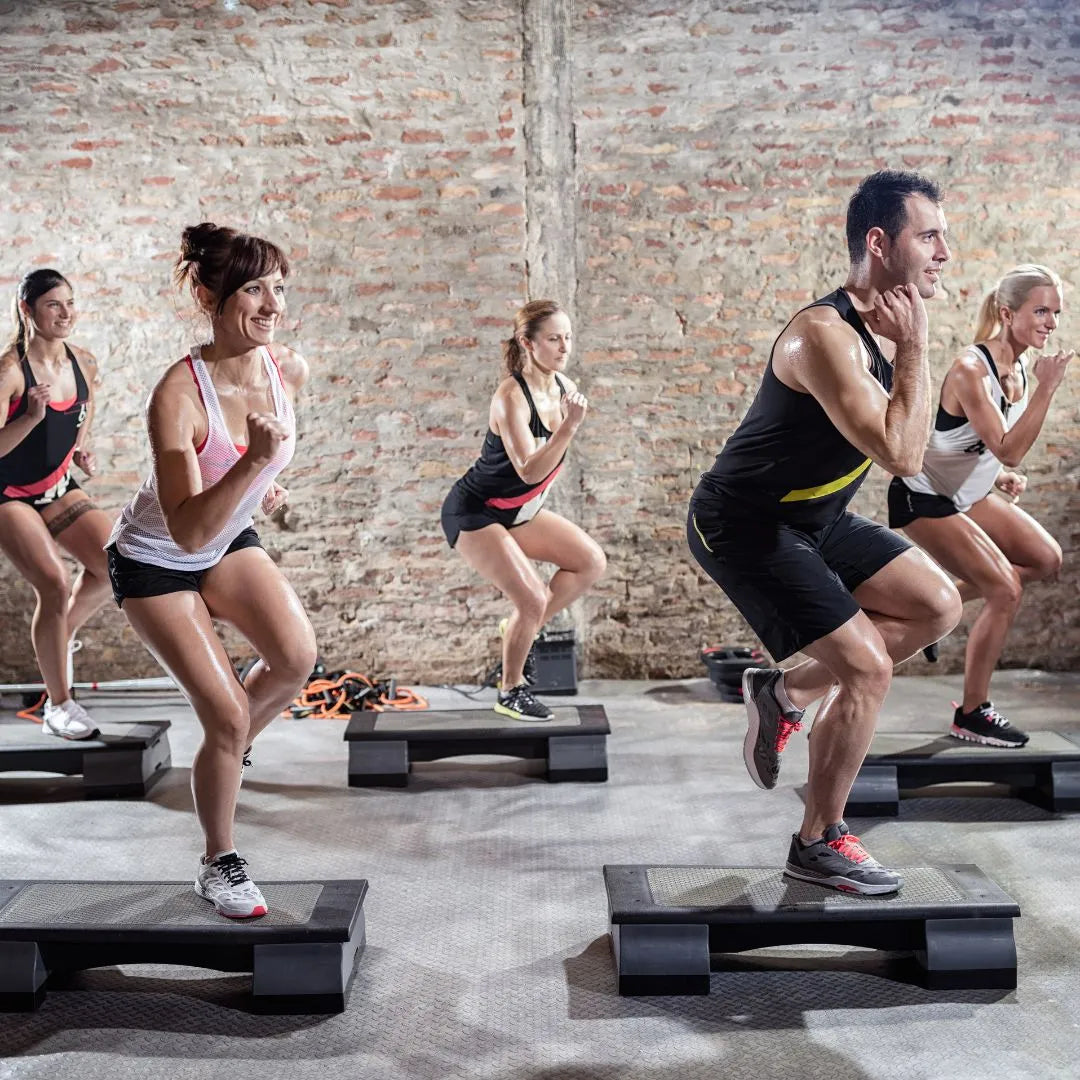Lift weights or do cardio; which should I do!? Do both! Aerobic and strength training are like the peanut butter and jelly of the fitness world and complement each other beautifully!
The question is, what's a good aerobic gym workout to use to get your cardiovascular training in? We'll give you several options in this article!
What Is Aerobic Exercise?
The terms "aerobic" and "anaerobic" can be used to separate two styles of training based on their metabolic demand;
- Aerobic- Refers to activity that requires the presence of oxygen to produce energy. This consists of low-moderate intensity performance lasting longer (>4 minutes). This includes things such as running, cycling, swimming, and rucking.
- Anaerobic- Refers to activity that does not require the presence of oxygen. This includes high-intensity activity such as weightlifting or sprinting.
To be clear, your different metabolic systems don't just turn on and off like a switch. Rather, they act more on a continuum.
So, when running is called "aerobic exercise," it means it primarily relies on your aerobic systems for energy. Keep this in mind when you hear things like "low-intensity burns fat" or "sprinting burns carbs."

Benefits Of Aerobic Exercise
1. Strengthens Your Heart (Lowers Blood Pressure)- The most obvious benefit of regular cardio is the strengthening of your heart. This includes all functions, such as:¹
- Lower Heart Rate
- Lower Blood Pressure
- Improved blood flow
2. Increase VO2max- Having a higher VO2 max means your body can better utilize oxygen. This leads to improved work efficiency and function, and researchers now believe it to be the best indicator of health and longevity²
3. Weight Maintenance/Weight Loss
Consistent aerobic exercise is obviously going to help increase your caloric burn. Assuming your diet is under control, you can knock out a nice chunk of calories with your aerobic training and help maintain your weight.
4. Improves Mental Health
One aspect that's not spoken about enough is the positive effect on one's mental health. Aerobic training results in the release of various "happy" hormones such as dopamine which can help boost mood and mental well being.
5. Decrease Risk Of Non-Communicable Disease (NCD)
Regular aerobic exercise helps maintain weight, improve VO2max and help control your metabolic system. All of these are crucial to health, so keeping them running smoothly can help mitigate the risk of developing various non-communicable diseases.
What Is Good Heart Rate For Aerobic Exercise?
We can say "aerobic" and "anaerobic", you may know what we mean but still have no idea how to tell which one you're doing based on the activity level of your metabolic systems! Therefore, to ensure proper intensity, it can be easier to measure your heart rate, as there is a correlation.
Here are the 5 different zones based on your heart rate.¹
- Zone: % Heart Rate Max // Intensity Level // Purpose
- Zone 1: 50-60% // Moderate-low // Warm-up, recovery, easy
- Zone 2: 60% to 70% // Moderate // Aerobic, endurance, base, light
- Zone 3: 70% to 80% // Moderate-high // Tempo, threshold, cardio, moderate
- Zone 4: 80% to 90% // Lactate threshold, redline, hard.
- Zone 5: 90% to 100% // Very-High, Max //Anaerobic, V02 max, peak,
Now, as you can see, Zone 2 is your ideal aerobic training level, which results in a max heart rate of 60-70%, but it can venture up to 80%.
With that in mind, there's no rule that you can't go harder or even a little slower. Just keep in mind that if you want to train your aerobic systems, you should stay in these heart rate zones.
Aerobic Training And The Talk Method
If you don't have a heart monitor, another more "primitive" method to determine intensity is the "talk method." The "talk method" simply has you try to talk as you exercise and then measure the difficulty of doing so.
Can you give a presentation? Or is saying a single word challenging? Proper intensity is somewhere in between.
The proper intensity for aerobic exercise should allow you to speak in short sentences during exercise. You shouldn't be able to sing or explain your metabolic systems, but neither should it be a challenge to say a couple of words.
Obviously, this is highly subjective, but it should give you an idea. On your next run, try to speak in complete sentences
What Are Good Aerobic Exercises?
At the end of the day, just about anything can be done at the proper intensity and duration to be classified as "aerobic. This can include your common exercises like;
- Running
- Cycling
- Swimming
However, it could also include other activities such as;
- Dancing
- Brisk walking
- Even sex!
This is important to understand for anyone who doesn't like "traditional exercise." With that said, the best aerobic exercise will be dependent on your personal situation. For example;
1. Why are you doing aerobic exercise? People look for aerobic exercise for different reasons. This can include;
- Burn fat
- Improve performance
- Improve cardio
- Increase general physical activity
Now, all aerobic exercise will improve these variables to some extent. However, your answers could change what's best for you.
2. Do you need low-impact exercise? If you have joint issues, running is going to be out of the picture, at least at first. Trainees with various joint issues may need to avoid running and stick with low-impact aerobic exercise.
3. What size are you? Some types of aerobic exercise are better for people with different body types. The good thing is there's something perfect for everyone!
4. What is your current fitness level? Some styles of aerobic training are easier to start for those with lower fitness levels. For example, running is probably the hardest type of aerobic exercise to start with if you have lower fitness levels. It can be very demanding, and many people struggle with running for 5 or 10 minutes.
5. What do you like? This one should be pretty obvious, but you should do what you like! Adherence is key, so if you don't like running, find something else!
What Aerobic Exercise Burns The Most Calories?
The million-dollar question!
Without considering any of the nuances, people burn more calories by running for an hour than by performing other exercises. This is due to the large demand placed on the entire body.
To give you some reference, here are the total calories a 180-pound man would burn performing the following cardio exercises at the gym;
- Running: 825-1,000
- Cycling: 660-800 calories
- Stairclimber: 600-700 Calories
- Swimming: 550-600 Calories
- Rower: 500-600 Calories
- Brisk Walking: 350-450 Calories
You can go check out this activity calculator from ACE Fitness to get more estimations based on your situation. And remember, these are estimates.⁴

Awesome Aerobic Gym Workouts
So now, let's get into some awesome cardio workouts that you can do at the gym. Compared to more intense exercises, aerobic training is generally easy to plan.
For example, you can often stick with a single exercise for an extended period of time. This works! So, we will have some simpler workouts, but we'll also lay out some cardio training with a bit more variables built in.
LISS (Low Intensity Steady State)
Sometimes the best choice for aerobics is the simplest. Jumping on a cardio machine, and knocking out 30-minutes of low-intensity training, can sometimes be the best option you have.
It has gotten a bad reputation recently, but most of the concerns are based on falsehoods. It's a simple and effective way to train your aerobic training and can be used with any style of aerobic exercise.
Triathlon
Don't worry, you're not doing an entire triathlon! Instead, you're just doing 3 different aerobic exercises back-to-back. Besides that, you have a lot of leeway with what you do.
However, we find doing 15-20 minutes per exercise works great.
If you want to make it similar to an actual triathlon, use the following cardio machines and time scheme, or at least a time ratio.
- Rowing or SkiErg: 10-Minutes
- Cycling: 30-Minutes
- Treadmill: 20-Minutes
Duathlon
A duathlon is simply using two exercises in 3 segments. It would look like this;
- Exercise A
- Exercise B
- Exercise A
Usually, the two exercises are running and cycling;
- Running 10 minutes
- Cycling 30 minutes
- Running 20 minutes
You can use any exercises you like, so long as they work slightly different mechanics.
Ascending Intervals
This protocol can be used for any cardio machine. You'll train on a single piece of equipment for an extended period of time nonstop.
While doing intervals, you'll alternate between low-intensity and moderate-high intensity. While you'll use the same low-intensity throughout, you'll increase the higher-intensity interval.
- 70% HRmax- 3:00
- 80% HRmax -1:00
- 70% HRmax - 3:00
- 85% HRmax - 1:00
- 70% HRmax - 3:00
- 90% HRmax- and so on.
- And continue.
Now, we just gave those numbers to give you an idea, but you can set it up according to what works for you and your available time.
One thing to remember…DO NOT get caught up with the high-intensity! This is still aerobic training, but we like the little bursts to give it something extra.
We will say this works well with the stair climber and incline treadmill.
Rucking
Rucking is a form of training adopted from the military. It consists of walking or hiking with a weighted backpack for prolonged durations. You can do this outside or inside on a treadmill.
It has an easy level of entry and low impact on the body. This makes it ideal for beginners to use. However, you can easily control the intensity by modifying the weight you carry or speed you walk.
Make Gym Cardio A Part Of Your Program
Don't keep cutting yourself short by dipping out on cardio. The reality is that cardio will provide tremendous benefits to your overall training and health. Plus, it's pretty easy to get in! Something as simple as going on a brisk 30-minute walk 5 times a week will get it done! Or, use some of these aerobic gym workouts to give you some ideas for your training!
References
- Solomon A, Borodulin K, Ngandu T, Kivipelto M, Laatikainen T, Kulmala J. Self-rated physical fitness and estimated maximal oxygen uptake in relation to all-cause and cause-specific mortality. Scand J Med Sci Sports. 2018;28(2):532-540. doi:10.1111/sms.12924 https://pubmed.ncbi.nlm.nih.gov/28543703/
- Olvera Lopez E, Ballard BD, Jan A. Cardiovascular Disease. In: StatPearls. Treasure Island (FL): StatPearls Publishing; August 22, 2023. https://pubmed.ncbi.nlm.nih.gov/30571040/
- American Heart Association. Target Heart Rates Chart. American Heart Association. Published March 9, 2021. https://www.heart.org/en/healthy-living/fitness/fitness-basics/target-heart-rates
- American Heart Association. American Heart Association Recommendations for Physical Activity in Adults and Kids. American Heart Association. Published January 19, 2024. https://www.heart.org/en/healthy-living/fitness/fitness-basics/aha-recs-for-physical-activity-in-adults











Garett Reid
Author